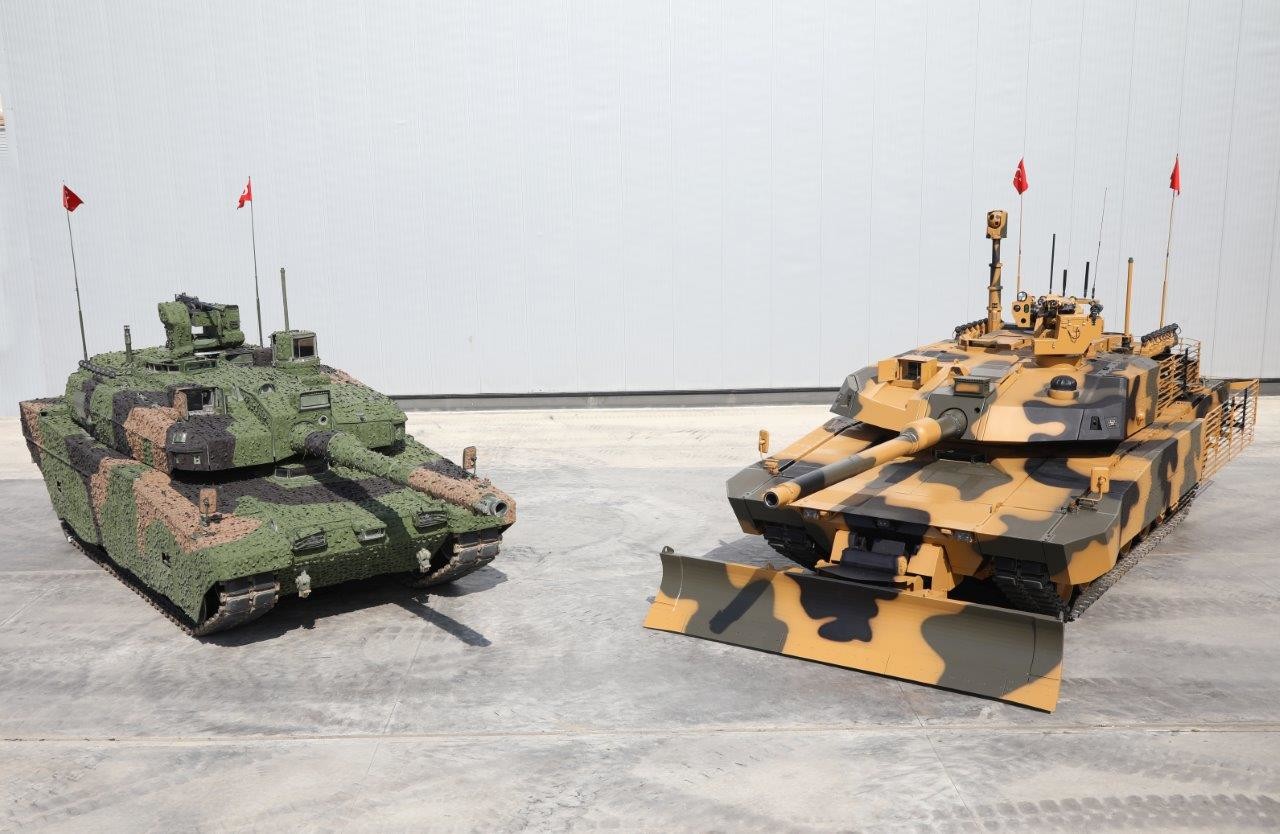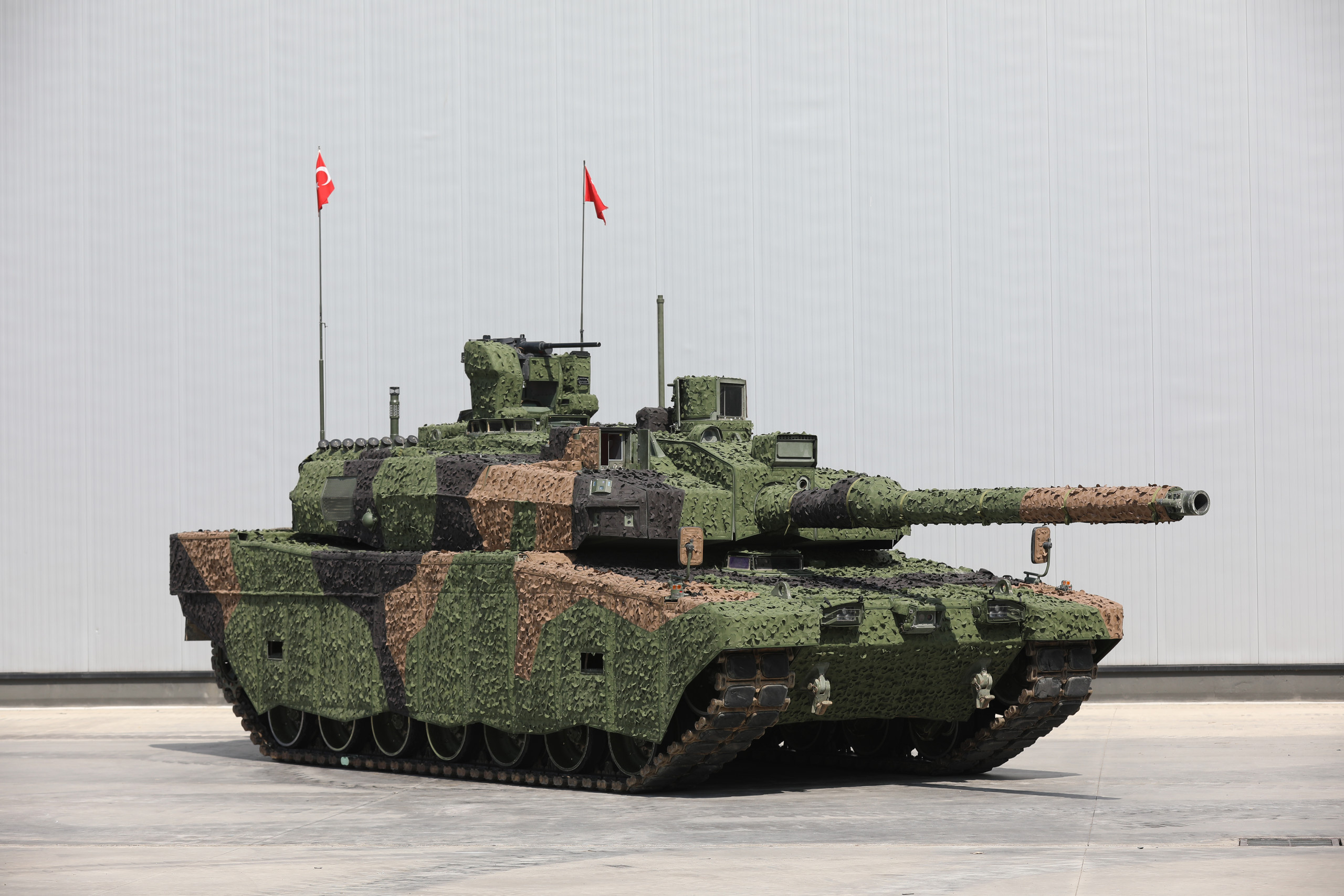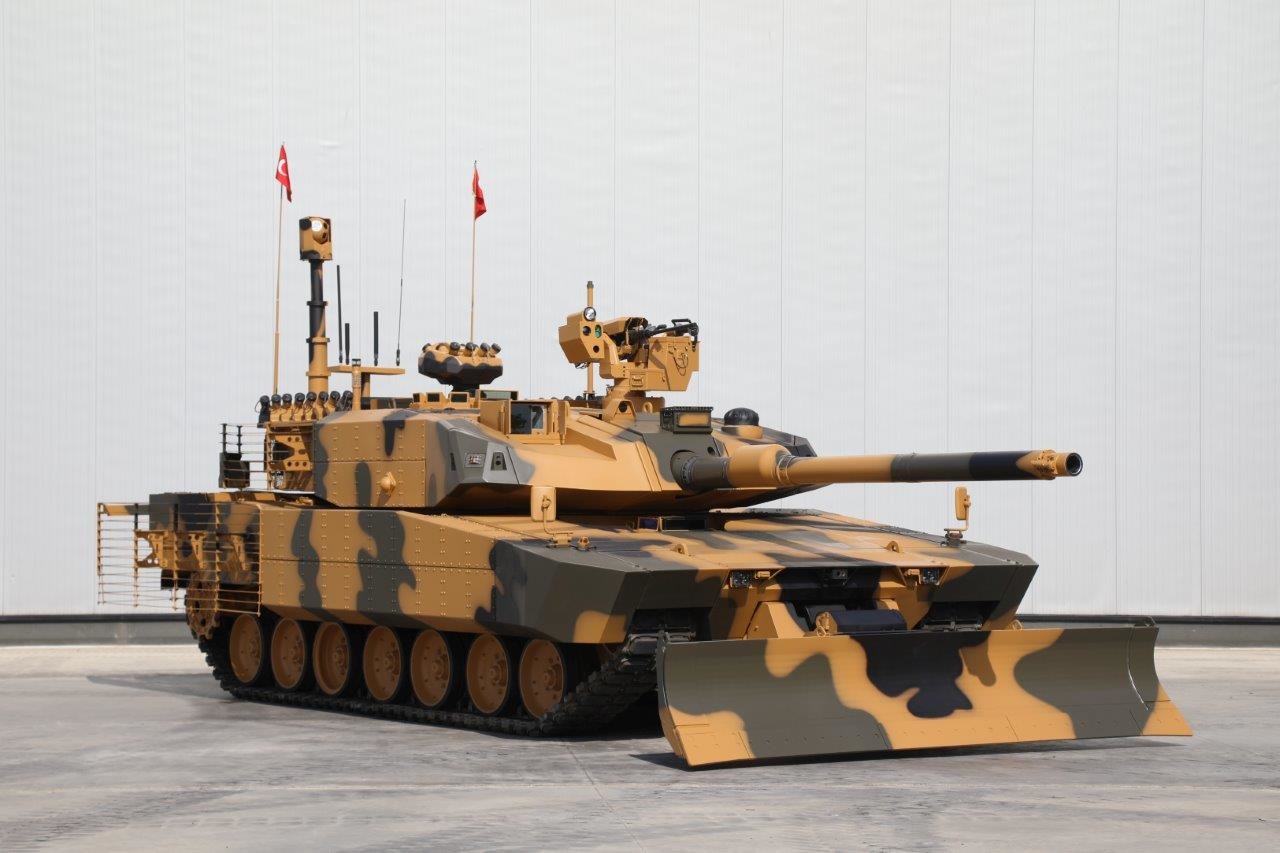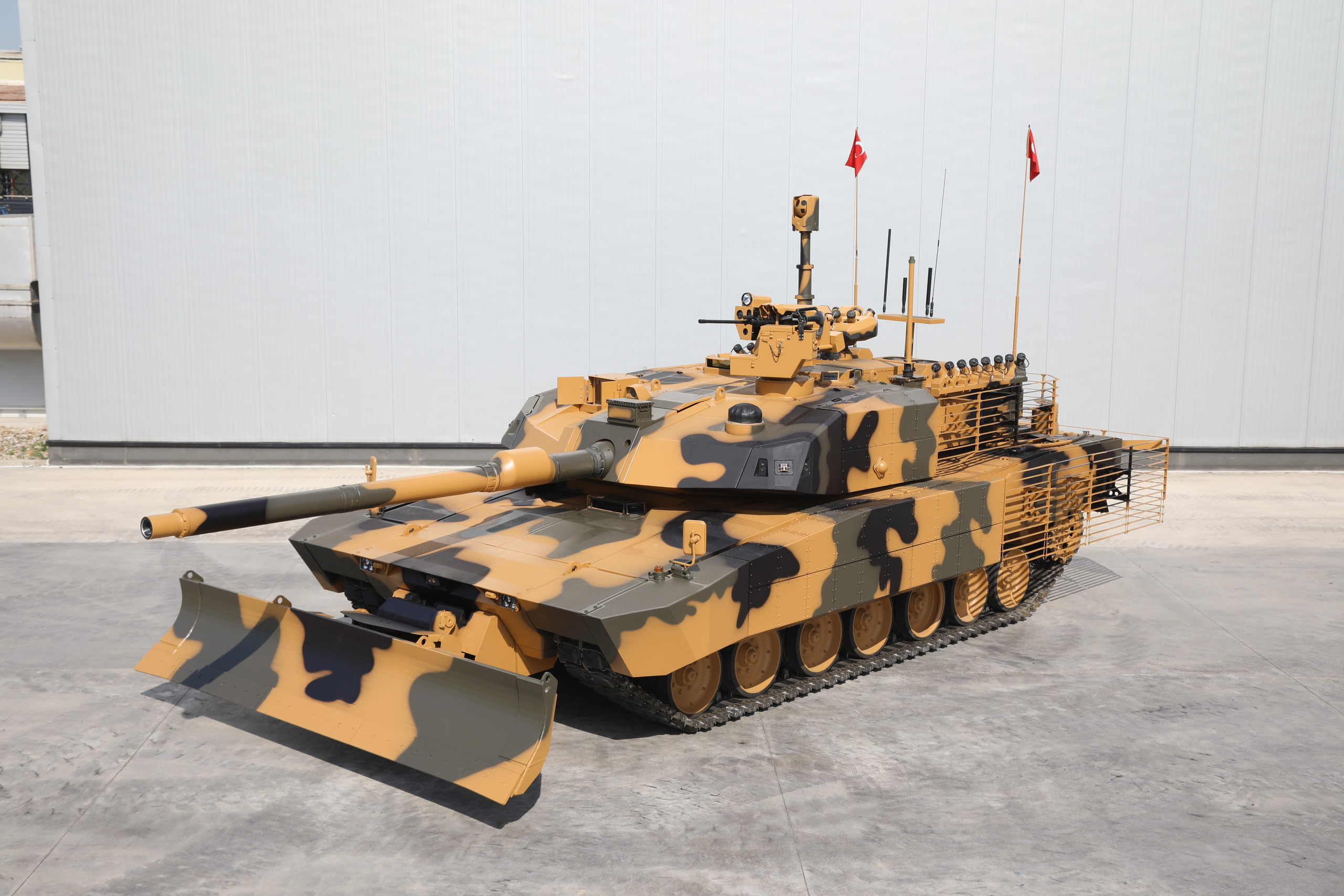You are using an out of date browser. It may not display this or other websites correctly.
You should upgrade or use an alternative browser.
You should upgrade or use an alternative browser.
Turkey Military News, Reports, Data, etc.
- Thread starter Jeff Head
- Start date
Jura The idiot
General
it's interesting In Turkey, new demands to evict US forces from Incirlik Air Base
A prominent Turkish newspaper has demanded the eviction of U.S. troops and warplanes from Incirlik Air Base as fallout there worsens from the Trump administration's controversial move to arm a Kurdish militia fighting the Islamic State in neighboring Syria.
In a front-page editorial published Friday, the newspaper Sozcu called for Incirlik's complete closure. It's an unlikely outcome, military officials and observers say, but a clear sign of how dramatically relations have deteriorated between the NATO allies.
The blustery display of anti-Americanism comes as the U.S.-backed coalition in Syria, which is poised to launch a long-awaited offensive to liberate the ISIS stronghold of Raqqa, faces widespread criticism across the border for its dependence on the YPG. The Kurdish militia force has emerged as America's most capable proxy there, but Turkey maintains it's a terrorist organization and has actively targeted the group's fighters in recent weeks.
The editorial is noteworthy, too, because Sozcu's coverage has been deeply critical of the Turkish government under President Recep Tayyip Erdogan, who expressed similar outrage when Washington's new arms deal with the YPG was announced last week and warned it would elicit blow-back. Erdogan is likely to vent his frustration to President Donald Trump when the two leaders meet this week at the White House.
Turkey approved the U.S. to fly attack and strike aircraft from Incirlik beginning in 2015, including close-air support missions conducted by A-10 Thunderbolts. Additionally, the U.S. bases EA-6B Prowlers there, which can jam ISIS communications and improvised explosive detonators, and the KC-135 Stratotankers responsible for aerial refueling.
In May 2016, accounted for nearly one-third of the international coalition's refueling operations and one-fifth of its close-air support. Today, those numbers are likely much higher as the war's tempo has intensified.
At the same time, Incirlik has become increasingly less hospitable for the 2,500 U.S. troops assigned there. Citing security concerns, commanders first locked down the base two years ago, prohibiting personnel and their families from venturing beyond its gates. Then, in March 2016, all 700 family members who remained there were ordered to evacuate.
Inside the Pentagon, arming the YPG is seen as a calculated gamble. To facilitate its air campaign against ISIS, the U.S. relies on Incirlik's proximity to Syria and Iraq — so there is some risk in alienating the Turks. Yet following last summer's coup attempt, Erdogan remains unpopular among large segments of Turkish society and most assuredly sees advantages to keeping the U.S. close.
Retired Adm. James Stavridis, NATO's supreme allied commander from 2009 to 2013, said Turkey is unlikely to close the base to U.S. operations because Ankara receives benefits tremendously from associated economic incentives and intelligence sharing. "Turkey," he added, "still values the NATO alliance, which brings prestige and a measure of security in a dangerous neighborhood."
Consider Operation Nomad, which since 2011 has provided Turkey with intelligence and beamed into joint fusion centers operating out of Ankara and Incirlik. Those feeds have supplied vital information about terrorists' movement across northern Syria and Iraq, intelligence Turkey is unlikely to surrender.
Officials at U.S. European Command echoed those sentiments. "Turkey closing their base, that would be hard to believe," said Capt. Daniel Hernandez, a spokesman. Incirlik, he added, is "strategically important to them and the coalition."
There would be painful political costs, too, said Aaron Stein, an expert on U.S.- Turkish relations at the Atlantic Council, a Washington think tank. “They would be blamed internationally for slowing the war against the Islamic State,” he said.
No, "Turkey has concluded it is better to be on the in than the out," Stein added. "At least on the in, you have a say at every coalition meeting."
TerraN_EmpirE
Tyrant King
This tank is wearing SAAB Barracuda Mobile Camouflage System, It has disruptive effects across the visual, IR and some radar wavelengths.
Jura The idiot
General
Yesterday at 5:53 PM
while today Germany Warns It Could Pull Its NATO Troops Out of Turkey Baseit's interesting In Turkey, new demands to evict US forces from Incirlik Air Base
source:Berlin on Monday slammed Ankara's refusal to allow German lawmakers to visit a NATO base near Syria and warned it could move its troops elsewhere.
The German foreign ministry described as "absolutely unacceptable" Turkey's latest ban on a visit to the Incirlik base in southern Turkey, used by the international coalition fighting the Islamic State group.
Germany has about 250 military personnel stationed there, flying Tornado surveillance missions over Syria and refueling flights for partner nations battling IS jihadists.
Chancellor Angela Merkel said Turkey's position was "unfortunate" and that Germany, while continuing talks to resolve the issue, would also "search for alternatives to Incirlik", including in Jordan.
A defense ministry spokesman said Jordan offered "the best conditions" after Berlin had also looked at Kuwait and Cyprus since Turkey first denied such visits to German MPs for several months last year.
The spokesman cautioned however that any move would involve shifting hundreds of containers of materiel and would take several months.
Turkey rejected the latest lawmakers' visit because of anger over Germany granting political asylum to some of its military officials since last year's failed coup against President Recep Tayyip Erdogan, foreign ministry spokesman Martin Schaefer suggested.
He said Ankara's reason may be "individual decisions of independent German authorities in connection with military members".
Merkel stressed that, since Germany's military missions always require parliamentary mandates, "it is absolutely essential that our lawmakers are able to visit our soldiers".
Hundreds have sought asylum
German media have reported that over 400 Turkish military personnel, diplomats, judges and other officials and their relatives had sought political asylum in Germany.
They fear being caught up in Turkey's crackdown against those Erdogan blames for the coup -- supporters of Fethullah Gulen, a reclusive US-based Islamic preacher who has denied the charges against him.
The vast crackdown has heightened tensions between Turkey and Germany, which is home to a three-million-strong ethnic Turkish population, the legacy of a massive "guest worker" programme in the 1960s and 1970s.
Both countries have sparred over a range of issues, including civil rights in Turkey, freedom of expression, the military campaign against Turkey's Kurdish minority and a prospective Turkish referendum on reintroducing the death penalty.
Relations were strained further since the arrest of Turkish-German journalist Deniz Yucel on terror-related charges in February, and during the referendum campaign in April to boost Erdogan's powers.
Another row last year, centred on a sensitive historical question, had led Turkey to deny German lawmakers the right to visit Incirlik for several months.
The German parliament had voted in June to recognise the Ottoman Empire's World War I-era massacre of Armenians as a genocide.
After the vote, a furious Erdogan accused German lawmakers of Turkish origin of having "tainted blood".
Armenians say up to 1.5 million people were killed between 1915 and 1917 as the Ottoman Empire was falling apart.
Turkey rejects the claims, arguing that 300,000 to 500,000 Armenians and as many Turks died in civil strife when Armenians rose up against their Ottoman rulers and sided with invading Russian troops.
That row was only resolved after Merkel made clear the Armenia resolution was a political statement and not legally binding, allowing German lawmakers to visit Incirlik in October.
Equation
Lieutenant General
Turkey is either becoming more of an independent state or getting themselves out of a NATO alliance. Right now they are stuck in between the two powers: the EU and Russia. And both have their conflicting interests with Turkey. President Erdogan not only has to walk a tight rope but juggling domestic issues as well.
Jura The idiot
General
let me add two things:Turkey is either becoming more of an independent state or getting themselves out of a NATO alliance. Right now they are stuck in between the two powers: the EU and Russia. And both have their conflicting interests with Turkey. President Erdogan not only has to walk a tight rope but juggling domestic issues as well.
#1 Mr. Erdogan by now knows who wanted to get rid of him last Summer;
#2 Turkey is needed not just to buy plenty of F-35s, but (I facepalm) manufacture vital components for the Marvel: Jul 23, 2016
the success story by :
Turkey
Industrial Participation
In total for Lockheed Martin and Pratt & Whitney, F-35 Production Industrial Participation opportunities for Turkish companies are expected to reach more than $12 billion.
Below are details on the 10 Turkish companies who have supported the development and/or production of F-35 / F135.
• Alp Aviation has been supporting the program since 2004 and currently manufactures F-35 production airframe structure and assemblies, production landing gear components and over 100 F135 production engine parts to include titanium integrated blade rotors.
• Aselsan is developing manufacturing approaches for advanced optical components, which are part of the F-35 Electro Optical Targeting System. They are also working with Northrup Grumman on the F-35 CNI Avionic Interface Controller and will initiate full scale production activities in the near term.
• Ayesas currently is the sole source supplier for two major F-35 components – missile remote interface unit and the panoramic cockpit display.
• Fokker Elmo manufactures 40 percent of the F-35 Electrical Wiring & Interconnection System (EWIS) and will also deliver and support TAI with all center section wiring systems. Fokker Elmo is also developing the EWIS for the F135 engine, for which a major share is produced in Fokker Elmo Turkey in Izmir.
• Havelsan has been supporting the F-35 training systems since 2005. Additionally, Havelsan has been instrumental as the Turkish lead for developing the construct of the future Turkish F-35 Integrated Pilot and Maintenance Training Center (ITC) and associated training systems in Turkey.
• Kale Aerospace has been supporting the F-35 since 2005. In conjunction with Turkish Aerospace Industries, they manufacture and produce F-35 airframe structures and assemblies. Kale Aero also supports Heroux Devtek as the sole source supplier for all three variants landing gear up lock assemblies. Additionally, Kale Aerospace has also established a joint venture in Izmir with Pratt & Whitney and is manufacturing production hardware for the F135 engine.
• MiKES has supported the F-35 Program during SDD delivering F-35 aircraft components and assemblies for BAE Systems and Northrop Grumman
• ROKETSAN and Tubitak-SAGE are the Turkish joint leadership team who strategically manage the development, integration, and production of the advanced precision-guided Stand-off Missile (SOM-J) which will be carried internally on the 5th Generation F-35 aircraft. Additionally, Lockheed Martin Missiles and Fire Control has partnered with Roketsan, through a teaming agreement, to jointly develop, produce, market and sell the advanced, precision guided Stand Off Missile – Joint Strike Fighter (SOM-J).
• Turkish Aerospace Industries (TAI) has been strategically supporting the F-35 Program since 2008. The company currently supplies production hardware that goes into every F-35 production aircraft. In conjunction with Northrup Grumman, TAI manufactures and assembles the center fuselages, produces composite skins and weapon bay doors, and manufactures fiber placement composite air inlet ducts. Additionally, TAI is strategically manufacturing 45 percent of the F-35’s including Air-to-Ground Pylons and adapters which is Alternate Mission Equipment (AME).
Additionally, Turkish Industry are going to have significant Industrial Participation role supporting Lockheed Martin and Pratt and Whitney for F-35 aircraft sustainment and F135 engine production and sustainment. Turkey has been given the approval to build its own F135 engines and was also selected to have the first European Regional F135 Engine depot overhaul capability. Both the engine production and overhaul will take place at the 1st HIBM in Eskisehir. Additionally, TAI has also been assigned to represent the organic depots of the Turkish Armed Forces within the Autonomic Logistic Global Sustainment (ALGS) system and Havelsan has been assigned as the Turkish Integrator for the National Integrated Training Center (ITC).
TerraN_EmpirE
Tyrant King
Actually it's more dangerous than that.Turkey is either becoming more of an independent state or getting themselves out of a NATO alliance. Right now they are stuck in between the two powers: the EU and Russia. And both have their conflicting interests with Turkey. President Erdogan not only has to walk a tight rope but juggling domestic issues as well.
Erdogan is a Neo-Ottomanist he believes that the Eurasian area should be dominated from Istanbul. To do that he will do whatever it takes to put his banner at the head.
NATO is not directly headed by the EU, and making things more difficult although the US is the Major player in NATO there is no way to push a NATO state out or to actually try and censor a NATO state gone wrong. This means that if Erdogan has fallen into the camp of Putin he can do more damage because unless Turkey leaves voluntarily they can't be pushed out.
Erdogan is happy to play both sides against each other, in hopes of his domination. there is no way NATO can do anything to stop him other than just not back his plays which would in turn push him to the Russians.
Equation
Lieutenant General
Actually it's more dangerous than that.
Erdogan is a Neo-Ottomanist he believes that the Eurasian area should be dominated from Istanbul. To do that he will do whatever it takes to put his banner at the head.
NATO is not directly headed by the EU, and making things more difficult although the US is the Major player in NATO there is no way to push a NATO state out or to actually try and censor a NATO state gone wrong. This means that if Erdogan has fallen into the camp of Putin he can do more damage because unless Turkey leaves voluntarily they can't be pushed out.
Erdogan is happy to play both sides against each other, in hopes of his domination. there is no way NATO can do anything to stop him other than just not back his plays which would in turn push him to the Russians.
True, but there is a risk for playing both sides against each other. On a good day you can win twice, and on a bad day you can lose TWICE! And Turkey can't afford to lose TWICE.
True, but there is a risk for playing both sides against each other. On a good day you can win twice, and on a bad day you can lose TWICE! And Turkey can't afford to lose TWICE.
But IMO it will lose twice if not more... the Turkish peoples already lost so much and given the current state of policy from Mr. Erdogan's government I won't expect anything better ... until one day everything goes down.
Deino
TerraN_EmpirE
Tyrant King
IDEF 2017: Upgraded M60T MBT breaks cover
Christopher F Foss, Istanbul - IHS Jane's International Defence Review
12 May 2017
Aselsan has partnered with the General Directorate of Military Factory (AFGM) to upgrade two of the Turkish Army's M60T main battle tanks (MBTs) with enhanced survivability.
Upgraded Turkish M60T MBT fitted with roof-mounted Aselsan SARP remote weapon station, cameras for situational awareness and laser warning system. The original explosive reactive armour package has been retained. (Christopher F Foss)
The effort follows the service's disastrous Euphrates Shield operation in Syria, where a number of its MBTs were destroyed or damaged.
Turkey took delivery of 170 upgraded M60T MBTs which were originally updated by Israel Military Industries (IMI), with most of the work carried out by the 2nd Main Maintenance Centre Command at Kayseria. The command has extensive experience with upgrading and overhauling MBTs and other tracked armoured fighting vehicles.
The upgraded M60T MBT has been fitted with Aselsan laser detectors which warn the crew of threats from laser designators and rangefinders as well as laser-guided missiles.
Cameras are provided to provide the crew with improved situational awareness through a full 360°, a feature considered essential in urban operations.
The original commander's cupola - which is armed with a .50 calibre machine gun (MG) - has been replaced with a new model that offers increased situational awareness.
Mounted on the roof of the upgraded M60T is an Aselsan Stabilised Advanced Remote Weapon Platform (SARP), which is armed with a stabilised 40 mm automatic grenade launcher (AGL) although this could be replaced by a 7.62 mm or .50 calibre MG.
The 120 mm smoothbore main gun and 7.62 mm coaxial MG are retained as are the banks of standard 76 mm electrically operated grenade launchers.
The upgraded M60T displayed at the exhibition was numbered 107 and retains the original IMI explosive reactive armour (ERA).
Roketsan confirmed to Jane's that it has developed a new ERA package for the M60T and that this had been fitted for initial mobility trials.
Roketsan has also revealed a net-type system designed to provide armoured vehicles with a higher level of protection against the widely deployed RPG-7 rocket-propelled grenade system and other weapons fitted with a single high-explosive anti-tank (HEAT) warhead.
bonus
New Medium Tank concept
IFV with 30mm




